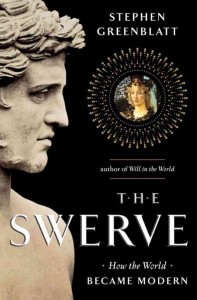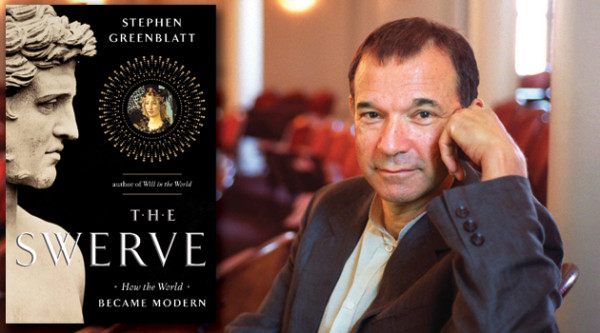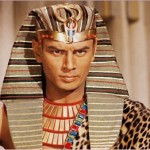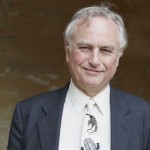Beating a Catholic Straw-Man: A Review of “The Swerve”
by Bishop Robert Barron
Filed under Book Reviews, History
In 2005, Harvard scholar Stephen Greenblatt published a wonderful book on Shakespeare called Will in the World: How Shakespeare Became Shakespeare. Witty, insightful and surprising, it caused thousands of people, including your humble scribe, to look at the Bard with new eyes. Thus it was with great anticipation that I opened my copy of Greenblatt’s latest The Swerve: How the World Became Modern. Like its forebear, this new book is indeed lively, intelligent and fun to read, but as I moved through it I grew increasingly irritated and finally exasperated by its steady insistence upon one of the most tired myths of the contemporary academy, namely, that the modern world, in all of its wonder and promise, emerged out of a long and desperate struggle with (wait for it) Roman Catholicism.
 The unlikely hero of Greenblatt’s story is one Poggio Bracciolini, a humanist of the early 15th century who labored as a scribe at the papal court and who, in his spare time, searched for ancient texts, neglected and moldering in monastic libraries across Europe. On a hunting expedition, most likely to the great monastery at Fulda, Poggio liberated a text that, Greenblatt holds, decisively shaped the evolution of the modern mind: the De rerum natura (On the Nature of Things), composed by the first century BC Roman writer Lucretius. In this philosophical poem Lucretius argued that the universe is made up exclusively of atoms—tiny, invisible particles—that, across infinite time and through infinite space, randomly arrange themselves into patterns and then fall apart. Furthermore, he taught that there is no divine mind governing the process; the soul is as mortal and dissoluble as the body; there is no afterlife; humans are not unique in the cosmos but rather are animals somewhat more evolved than others; religion is fear-based and cruel; and the whole point of life is to maximize pleasure and avoid pain. The rather cold and grim vision of the universe laid out in the De rerum natura Greenblatt takes as a harbinger of “modern” view that happily holds sway today—at least in Ivy League faculty lounges.
The unlikely hero of Greenblatt’s story is one Poggio Bracciolini, a humanist of the early 15th century who labored as a scribe at the papal court and who, in his spare time, searched for ancient texts, neglected and moldering in monastic libraries across Europe. On a hunting expedition, most likely to the great monastery at Fulda, Poggio liberated a text that, Greenblatt holds, decisively shaped the evolution of the modern mind: the De rerum natura (On the Nature of Things), composed by the first century BC Roman writer Lucretius. In this philosophical poem Lucretius argued that the universe is made up exclusively of atoms—tiny, invisible particles—that, across infinite time and through infinite space, randomly arrange themselves into patterns and then fall apart. Furthermore, he taught that there is no divine mind governing the process; the soul is as mortal and dissoluble as the body; there is no afterlife; humans are not unique in the cosmos but rather are animals somewhat more evolved than others; religion is fear-based and cruel; and the whole point of life is to maximize pleasure and avoid pain. The rather cold and grim vision of the universe laid out in the De rerum natura Greenblatt takes as a harbinger of “modern” view that happily holds sway today—at least in Ivy League faculty lounges.
To make his story more dramatic, Greenblatt had to portray Poggio as a culture warrior, battling against a retrenched and oppressive Catholicism—and this is where his book really goes off the rails. I will give just a few examples of the egregious caricature of medieval Christianity that he feels compelled to present.
Whereas Lucretius, Poggio, and their modern intellectual successors were marked by a restless curiosity and an adventurous desire to explore the physical universe, Catholics, Greenblatt maintains, were dogmatic, repressive, and exclusively other-worldly. As evidence for this claim, he cites the medieval conviction, cultivated especially in the monasteries, that curiositas is a sin. Well, it might have helped if he had searched out what medieval Christians meant by that term. He would have discovered that curiositas names, not intellectual curiosity, but what we might characterize as gossip or minding other people’s business, seeking to know that which you have no business knowing.
In point of fact, the virtue that answers the vice of curiositas is studiositas (studiousness), the serious pursuit of knowledge. And as anyone even mildly familiar with medieval Christianity knows, this virtue was exemplified by some of the greatest spirits that western civilization has produced. St. Albert the Great assiduously studied Aristotelianism, which was the leading science of his time and which was concerned, above all, with searching out the causes of things; St. Thomas Aquinas’s soaring intellectualism is on vivid display on every page of his voluminous work, which runs the gamut from God and the angels to planets, plants, human societies, economics, politics, animals, etc.
Bonaventure, Duns Scotus, William of Occam, Alexander of Hales, Henry of Ghent, Roger Bacon—to name just some of the most prominent figures—pursued scientific, practical and metaphysical questions with an intensity and, yes, curiosity rarely rivaled. I readily grant that an intellectual paradigm shift occurred in the 16th century, but to claim that the sciences emerged out of rank and uncurious superstition is simply a calumny.
A second feature of Greenblatt’s caricature is that medieval Christianity was dualistic, morose, deeply opposed to the pleasures of the body, and masochistic in its asceticism. As evidence he brings forward the many accounts of self-flagellation and use of the “discipline” that took place in medieval monasteries and among penitential societies. No one can deny that such practices were a feature of medieval religious life, but to take them as somehow paradigmatic of the medieval attitude toward the body is simply ridiculous.
Nowhere in the literature of the world do we see more boisterous and even bawdy celebrations of the body, sensual pleasure and sexuality than in Dante’s Divine Comedy, Chaucer’s Canterbury Tales, and Boccaccio’s Decameron; and even a casual glance at the figures in the colored glass windows of Chartres Cathedral or the Sainte Chapelle reveals an extraordinary celebration of the energy and color of ordinary life. That the dominant Christian attitude in the Middle Ages was a life-denying asceticism is quite absurd.
Despite Greenblatt’s assertions, the Catholic Middle Ages did not require Lucretius’s De rerum natura to learn the importance of either intellectual curiosity or the joys of this life. And in point of fact, the cultural world of modernity that emerged through the exertions of Descartes, Pascal, Galileo, Newton, Jefferson and company actually owed a great deal, intellectually and artistically, to the medieval period. The story of modernity’s rise is much more complex and finally much more interesting than the one told by Stephen Greenblatt, and it is altogether possible to celebrate the legitimate achievements of modern culture without knocking down a straw-man version of Catholicism.
Related Posts
Note: Our goal is to cultivate serious and respectful dialogue. While it's OK to disagree—even encouraged!—any snarky, offensive, or off-topic comments will be deleted. Before commenting please read the Commenting Rules and Tips. If you're having trouble commenting, read the Commenting Instructions.













